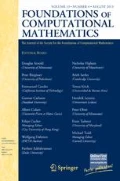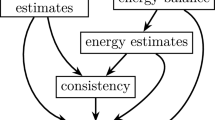Abstract
We study convergence of a mixed finite element–finite volume numerical scheme for the isentropic Navier–Stokes system under the full range of the adiabatic exponent. We establish suitable stability and consistency estimates and show that the Young measure generated by numerical solutions represents a dissipative measure-valued solutions of the limit system. In particular, using the recently established weak–strong uniqueness principle in the class of dissipative measure-valued solutions we show that the numerical solutions converge strongly to a strong solutions of the limit system as long as the latter exists.
Similar content being viewed by others
References
E. Chiodaroli, C. De Lellis, and O. Kreml. Global ill-posedness of the isentropic system of gas dynamics. Comm. Pure Appl. Math., 68(7) (2015), 1157–1190.
Y. Cho, H.J. Choe, and H. Kim. Unique solvability of the initial boundary value problems for compressible viscous fluids. J. Math. Pures. Appl., 83 (2004), 243–275.
C. De Lellis and L. Székelyhidi, Jr. On admissibility criteria for weak solutions of the Euler equations. Arch. Ration. Mech. Anal., 195(1) (2010), 225–260.
V. Dolejší, M. Feistauer, J. Felcman and A. Kliková. Error estimates for barycentric finite volumes combined with nonconforming finite elements applied to nonlinear convection-diffusion problems. Appl. Math., 47 (2002), 301–340.
E. Feireisl, P. Gwiazda, A. Świerczewska-Gwiazda, and E. Wiedemann. Dissipative measure-valued solutions to the compressible Navier-Stokes system. Calc. Var. Partial Differential Equations, 55(141) (2016), 20.
E. Feireisl, R. Hošek, D. Maltese, and A. Novotný. Convergence and error estimates for bounded numerical solutions of the barotropic Navier–Stokes system. Numer Methods Partial Differential Eq. Published online doi:10.1002/num.22140.
E. Feireisl, T. Karper, and M. Michálek. Convergence of a numerical method for the compressible Navier-Stokes system on general domains. Numer. Math., 134(2016), 667–704.
E. Feireisl, T. Karper, and M. Pokorný. Mathematical theory of compressible viscous fluids: Analysis and numerics. Birkhäuser-Verlag, Basel, 2017.
E. Feireisl, L. Lukáčová-Medvid’ová, Š. Nečasová, A. Novotný, and B. She. Asymptotic preserving error estimates for numerical solutions of compressible Navier–Stokes equations in the low Mach number regime. 2016. Preprint IM Prague, 2016-49.
E. Feireisl, A. Novotný, and H. Petzeltová. On the existence of globally defined weak solutions to the Navier-Stokes equations of compressible isentropic fluids. J. Math. Fluid Mech., 3 (2001), 358–392.
M. Feistauer. Mathematical Methods in Fluid Dynamics. Pitman Monographs and Surveys in Pure and Applied Mathematics Series 67, Longman Scientific & Technical, Harlow, 1993.
M. Feistauer, J. Felcman, and M. Lukáčová-Medvid’ová. Combined finite element-finite volume solution of compressible flow, J. Comput. and Appl. Math., 63 (1995), 179–199.
M. Feistauer, J. Felcman, M. Lukáčová-Medvid’ová, and G. Warnecke. Error estimates of a combined finite volume – finite element method for nonlinear convection – diffusion problems. SIAM J. Numer. Anal., 36(5) (1999), 1528–1548.
M. Feistauer, J. Felcman, and I. Straškraba. Mathematical and Computational Methods for Compressible Flow. Clarendon Press, Oxford, 2003.
M. Feistauer, J. Česenek, and V. Kučera. Discontinuous Galerkin method—a robust solver for compressible flow, Recent developments in the numerics of nonlinear hyperbolic conservation laws, Notes Numer. Fluid Mech. Multidiscip. Des., 120 (2013), 143–160.
U. Fjordholm, S. Mishra, and E. Tadmor. Arbitrarily high order accurate entropy stable essentially non-oscillatory schemes for systems of conservation laws. SIAM J. Num. Anal., 50 (2012), 544–573.
U. Fjordholm, R. Kappeli, S. Mishra, and E. Tadmor. Construction of approximate entropy measure valued solutions for hyperbolic systems of conservation laws. Foundations Comp. Math. (2015), 1–65.
U. Fjordholm, S. Mishra, and E. Tadmor. On the computation of measure-valued solutions. Acta Numer. (2016), 567–679.
T. Gallouët, L. Gastaldo, R. Herbin, and J.-C. Latché. An unconditionally stable pressure correction scheme for the compressible barotropic Navier-Stokes equations. M2AN Math. Model. Numer. Anal., 42(2) (2008), 303–331.
T. Gallouët, R. Herbin, and J.-C. Latché. Kinetic energy control in explicit finite volume discretizations of the incompressible and compressible Navier–Stokes equations. Int. J. Finite Vol., 7(2) (2010), 1634–1655.
T. Gallouët, R. Herbin, D. Maltese, and A. Novotný. Error estimate for a numerical approximation to the compressible barotropic Navier-Stokes equations. IMA J. Numer. Anal., 36 (2016), 543–592.
P. Gwiazda, A. Świerczewska-Gwiazda, and E. Wiedemann. Weak-strong uniqueness for measure-valued solutions of some compressible fluid models. Nonlinearity, 28 (2015), 3873–3890.
V. Jovanović and Ch. Rohde. Error estimates for finite volume approximations of classical solutions for nonlinear systems of hyperbolic balance laws. SIAM J. Numer. Anal., 43(6) (2006), 2423–2449.
K. H. Karlsen and T. K. Karper. A convergent nonconforming finite element method for compressible Stokes flow. SIAM J. Numer. Anal., 48(5) (2010), 1846–1876.
K. H. Karlsen and T. K. Karper. Convergence of a mixed method for a semi-stationary compressible Stokes system. Math. Comp., 80(275) (2011), 1459–1498.
K. H. Karlsen and T. K. Karper. A convergent mixed method for the Stokes approximation of viscous compressible flow. IMA J. Numer. Anal., 32(3) (2012), 725–764.
T. K. Karper. A convergent FEM-DG method for the compressible Navier-Stokes equations. Numer. Math., 125(3) (2013), 441–510.
D. Kröner. Numerical Schemes for Conservation Laws. Wiley-Teubner, 1997.
P.-L. Lions. Mathematical topics in fluid dynamics, Vol.2, Compressible models. Oxford Science Publication, Oxford, 1998.
A. Matsumura and T. Nishida. The initial value problem for the equations of motion of compressible and heat conductive fluids. Comm. Math. Phys., 89 (1983), 445–464.
P. I. Plotnikov and W. Weigant. Isothermal Navier-Stokes equations and Radon transform. SIAM J. Math. Anal., 47(1) (2015), 626–653.
Y. Sun, C. Wang, and Z. Zhang. A Beale-Kato-Majda criterion for three dimensional compressible viscous heat-conductive flows. Arch. Ration. Mech. Anal., 201(2) (2011), 727–742.
L. Székelyhidi and E. Wiedemann. Young measures generated by ideal incompressible fluid flows. Arch. Rational Mech. Anal., 206 (2012), 333–366.
E. Tadmor. Perfect derivatives, conservative differences and entropy stable computation of hyperbolic conservation laws. Discr. Cont. Systems, 36(8) (2016), 4579–4598.
E. Tadmor. Entropy stability theory for difference approximations of nonlinear conservation laws and related time-dependent problems. Acta Numer., 12 (2003), 451–512.
E. Tadmor, W. Zhong. Entropy stable approximations of Navier-Stokes equations with no artificial numerical viscosity. J. Hyperbolic Differ. Equ., 3 (2006), 529–559.
Author information
Authors and Affiliations
Corresponding author
Additional information
Communicated by Eitan Tadmor.
E. Feireisl leading to these results has received funding from the European Research Council under the European Union’s Seventh Framework Programme (FP7/2007–2013)/ ERC Grant Agreement 320078. The Institute of Mathematics of the Academy of Sciences of the Czech Republic is supported by RVO: 67985840. M. Lukáčová-Medvid’ová has been supported by the German Science Foundation under the grants LU 1470/2–3 and the Collaborative Research Centers TRR 146 and TRR 165.
Rights and permissions
About this article
Cite this article
Feireisl, E., Lukáčová-Medvid’ová, M. Convergence of a Mixed Finite Element–Finite Volume Scheme for the Isentropic Navier–Stokes System via Dissipative Measure-Valued Solutions. Found Comput Math 18, 703–730 (2018). https://doi.org/10.1007/s10208-017-9351-2
Received:
Revised:
Accepted:
Published:
Issue Date:
DOI: https://doi.org/10.1007/s10208-017-9351-2
Keywords
- Compressible Navier–Stokes system
- Finite volume scheme
- Finite element scheme
- Stability
- Convergence
- Measure-valued solution



